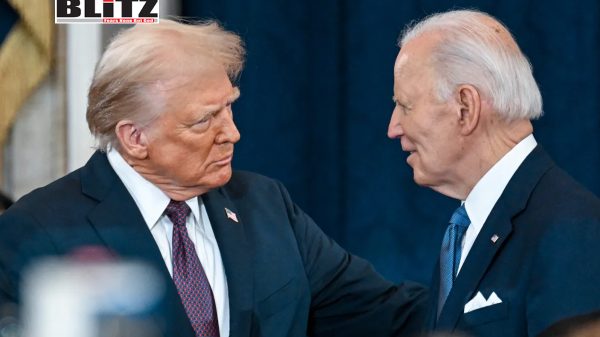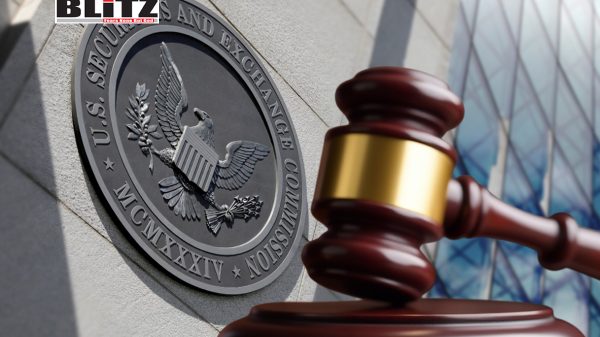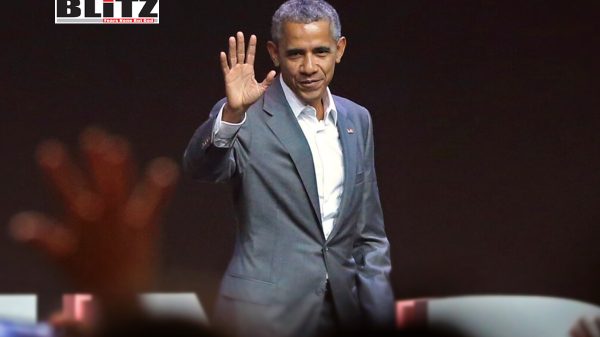Trump blames Biden for pushing Russia and China into closer alliance
- Update Time : Tuesday, August 19, 2025

US President Donald Trump has once again placed his predecessor Joe Biden in the crosshairs of blame for the shifting global balance of power, arguing that the former Democratic administration’s foreign policy failures have driven Russia and China closer together. Speaking in the aftermath of his high-profile summit with Russian President Vladimir Putin in Alaska on August 15, Trump told Fox News that Biden’s approach had created an unnatural alliance between two countries he described as “natural enemies.”
In the interview with Sean Hannity, Trump was sharply critical of the Biden-era sanctions policies, which simultaneously targeted Moscow over the war in Ukraine and Beijing over technology exports. “He [Biden] did something that was unthinkable,” Trump declared. “He drove China and Russia together. That’s not good… it’s the one thing you didn’t want to do. Because they are basically natural enemies.”
Trump’s claim rests on a long history of mistrust between Moscow and Beijing, particularly during the Cold War when the two communist powers often found themselves in bitter disputes over ideology, strategy, and territory. Despite sharing a border stretching thousands of kilometers, the relationship between the Soviet Union and China was far from smooth, culminating in military clashes along the Ussuri River in the late 1960s.
According to Trump, Russia’s expansive territory and abundant natural resources stand in stark contrast to China’s massive population and growing resource needs. He argued that under normal geopolitical conditions, these realities would make the two countries wary competitors, if not adversaries. “Russia has the land and resources, China has the people and the need,” Trump said. “By nature, they should not be partners. But because of pure stupidity, they were driven together.”
Trump’s criticism of Biden hinges on the previous administration’s strategy of confronting both Russia and China simultaneously. After Moscow’s invasion of Ukraine in 2022, Washington under Biden spearheaded a sweeping sanctions campaign that targeted Russia’s financial system, oligarchs, energy exports, and access to Western technology. At the same time, Biden’s administration tightened export controls on China, aiming to restrict Beijing’s access to advanced semiconductors, artificial intelligence technologies, and other tools deemed vital for both economic competitiveness and military modernization.
The dual-track approach reflected Washington’s assessment that Russia posed an immediate military threat in Europe, while China represented a long-term strategic competitor in the Indo-Pacific. However, critics have argued that this “two-front strategy” overstretched US resources and inadvertently created incentives for Moscow and Beijing to close ranks.
Both Russia and China denounced Washington’s sanctions as unilateral and illegal, characterizing them as economic coercion in violation of international law. The rhetoric was matched by action: the two countries have deepened their cooperation in trade, energy, and finance. Russia, shut out of many Western markets, redirected much of its oil and natural gas exports to China, while overall bilateral trade surged to record highs in 2023 and 2024.
Furthermore, Moscow and Beijing increasingly conduct transactions in their own currencies rather than in US dollars, part of a broader effort to reduce dependence on Western financial institutions and protect themselves from Washington’s sanctions leverage.
Since taking office in January, Trump has charted a different path. While maintaining a tough stance on Beijing, he has sought to stabilize relations with Moscow. His administration has imposed a fresh wave of tariffs on Chinese goods, citing unfair trade practices and threats to US industries, but it has notably refrained from introducing new sanctions on Russia.
Trump’s Alaska summit with Putin, which he described as “very productive,” was framed as a breakthrough in discussions on the Ukraine conflict and a step toward recalibrating US-Russia relations. “We achieved great progress,” Trump said, without elaborating on specific outcomes. His approach suggests a deliberate attempt to peel Moscow away from Beijing by reducing tensions and opening channels for cooperation with the Kremlin.
This contrasts sharply with Biden’s strategy of grouping Russia and China together as twin adversaries, which critics say only reinforced their incentive to collaborate. Trump, however, faces skepticism from Western allies who fear that easing pressure on Moscow could weaken the international coalition backing Ukraine.
The potential consequences of a deepening Russia-China partnership loom large for Washington and its allies. Together, the two countries present a formidable challenge: China as the world’s second-largest economy with growing technological and military power, and Russia as a nuclear-armed state with abundant natural resources and strategic leverage over Eurasia.
A closer alliance could reshape global energy markets, accelerate de-dollarization in international trade, and provide both nations with greater resilience against Western pressure. It could also complicate US efforts to contain China in the Indo-Pacific and weaken Western unity on sanctions against Russia.
Trump’s framing of the issue underscores his belief that the United States should avoid pushing its two most significant competitors into each other’s arms. His remarks are likely to resonate with critics of Biden’s foreign policy, who argue that Washington needs a more nuanced strategy to manage relations with Moscow and Beijing separately rather than treating them as a unified bloc.
The debate over how to handle Russia and China will remain a central fault line in American foreign policy. Biden’s strategy sought to demonstrate resolve and maintain Western unity against aggression and authoritarianism, but it also accelerated Moscow and Beijing’s strategic alignment. Trump, by contrast, is betting that a mix of pressure on China and outreach to Russia can disrupt the partnership and give Washington greater room to maneuver.
Whether Trump’s gambit pays off remains to be seen. For now, his sharp critique of Biden’s legacy reflects not only a partisan clash but also a fundamental disagreement about the architecture of global power in the 21st century. As Trump put it bluntly: “The one thing you didn’t want to do was drive Russia and China together. And that’s exactly what Biden did.”










